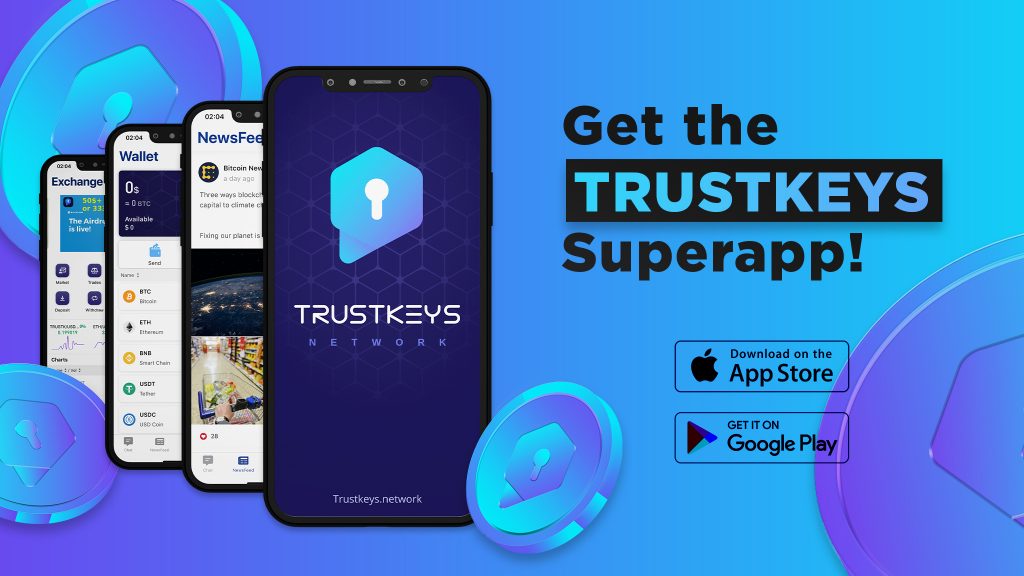TRUSTK has several important characteristics that make it the ideal currency for a new generation of exchange, consumer applications, and the digital assets that will power them:
- Diverse use-cases
- Broad distribution
- Low monetary inflation
Each of these is explained in more detail below.
1. Diverse use-cases
- Community Voting Rights — TRUSTK holders can participate and vote in the growth of the community.
- Gas Fee Reduction & Slippage Subsidies — Trading costs will be reduced by being a TRUSTK token holder in campaigns from time to time.
- Liquidity Mining — Liquidity mining programs with LP pairs will be live on the ETH, BSC, TRON chains with the following pairs: TRUSTK/ETH, TRUSTK/USDT, TRUSTK/USDTK, TRUSTK/BNB, TRUSTK/BUSD.
- CEX Trading VIP Membership — Token Holders with large holdings will gain taker/maker fee premiums, trading fee subsidies, token withdrawal fee subsidies, limited access to the institutional PME arbitrage tool.
- Collateral as Margin for Lending.
- Token holders can earn rewards by staking their TrustKeys as a security deposit and working to secure the network through running validator nodes – or delegating their stake to professional operators to run validator nodes on their behalf. Validator nodes receive staking rewards and transaction fees in exchange for providing the security, computation, and storage services the network needs.
- Small amounts of TRUSTK token are also required for every activity on the network – from new user accounts to storage for assets and smart contracts. As the network matures, TRUSTK token holders will be able to use their TRUSTK in an evolving number of ways:
- Payment for computation and validation services (i.e., transaction fees)
- Medium of exchange
- Deposit for data storage
- Collateral for secondary tokens
- Participation in governance
TRUSTK has high throughput, low fees, and full ACID guarantees, allowing developers to implement decentralized exchanges (DEXs) that act as a clearing house between tokens. TRUSTK has the ability to use frequent batch auctions to defeat front-running attacks on these DEXs.
2. Broad distribution
The distribution of the native token is critical to the network’s decentralization and long-term success. Centralized control over the token supply prevents easy access by developers, who require the native token to deploy new smart contracts and pay for transaction fees (“gas”) as well as cover storage and account deposits on the network.
For TrustKeys to achieve its full potential, a safe and sustainable distribution strategy is critical: we must get TrustKeys token into the right people’s hands. Alongside technical capability and crypto-economic security, we recognize that a healthy and sustainable distribution strategy is essential for making the TrustKeys blockchain successful in the long term.
TrustKeys will be the catalyst for diverse new communities to access blockchain and decentralized applications, building and benefiting from real use-cases rather than speculation. Good user experience design will make owning and using TrustKeys seamless. Ultimately, TrustKeys will bring all of the communities building on the network together to create and share value.
TrustKeys is pioneering several large-scale engagement programs:
- Cloudburst Partners: organizations or individuals elected by TRUSTK holders to operate one or more TrustKeys validator nodes and distribute the rewards to developers, designers, artists, community organizers, and entrepreneurs building content for the TrustKeys network.
- Floodplain Validators: developers, infrastructure partners, and other ecosystem participants interested in supporting TrustKeys early and helping bootstrap the critical mass of content and decentralized resources necessary for a sustainable network.
- Decentralized Reputation and Incentive Protocol (DRIP): designed for accessibility and helping apps on the TrustKeys find an engaged userbase, DRIP distributes TRUSTK token to end users for purposes of, staking, delegation and active participation in the TrustKeys economy.
Thanks to robust technology, an amazing community, and strong incentive design, TrustKeys will enable today’s early adopters to build tomorrow’s open worlds.
3. Low Monetary Inflation
Blockchains like TrustKeys are powered by decentralized communities running the computer hardware (“validator nodes”) that support the activity and secure the value of assets on the etwork. Other blockchains rely heavily on creating and distributing new tokens (“monetary inflation”) in order to attract validator node operators to their networks.
Unfortunately, as in all economies, monetary inflation has a cost: the newly-created supply of tokens acts as a tax on holding or day-to-day usage by diluting all token holders. This is why TrustKeys has a cap on monetary inflation. In fact, inflation on TrustKeys will go down as network fees increase.
In its steady state, TrustKeys guarantees a set payout to node operators and only issues new tokens as necessary to make up the difference between transaction fees and that guaranteed payment. As transaction fees approach this payout amount, new issuance approaches 0%. If transaction fees exceed the payout amount, they are held in an escrow account and used to offset future inflation indefinitely.
In the first year of operation, monetary inflation will be higher to incentivize greater levels of staking while the collateral, payments, and other complementary parts of the TrustKeys economy mature.

